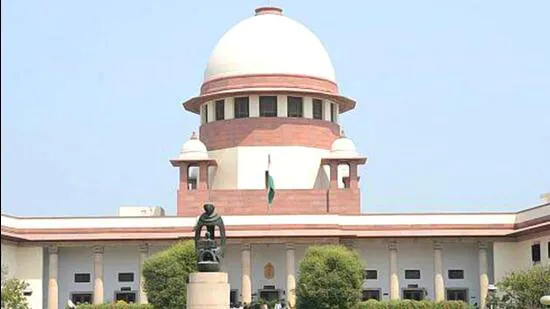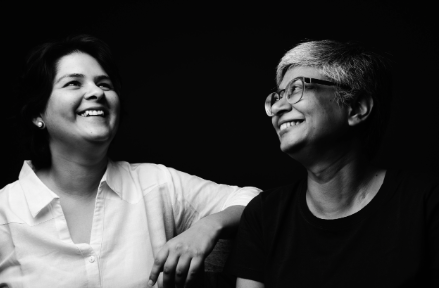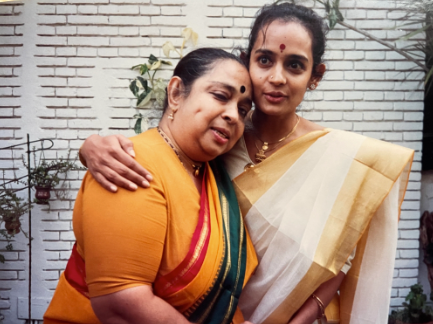
Same-sex couples and unmarried partners are entitled to legal protections and all the benefits available under social welfare legislation, noted a two-judge bench of the Supreme Court.
Justices DY Chandrachud and AS Bopanna said family can also take the form of ‘domestic, unmarried partnerships, or queer relationships’ while hearing a case on maternity leave benefits.
It was while hearing this case that the judges noted, “Atypical manifestations of the family unit are equally deserving not only of protection under the law but also of the benefits available under social welfare legislation.”
Later in the week, speaking at a public event Justice Chandrachud spoke of how the decriminalisation of homosexuality alone could not guarantee equality, which had to be reflected in the home, workplace and public spaces.
All about loving your family

Kavita Arora and Ankita Khanna, partners for 8 years (Credit: Yeashu Yuvraj)
Marriage rights would seem to be the next logical step after homosexuality was decriminalised by the Supreme Court in 2018.
The pandemic gave the issue further urgency. For instance, a partner who is not a spouse cannot be considered next-of-kin. That partner does not get a voice in medical treatment and options, including end-of-life decisions. There are no automatic financial rights and protections.
It was this realisation that led Kavita Arora and Ankita Khanna, mental health professionals and live-in partners for eight years to apply to marry under the Special Marriage Act (SMA) in September 2020. When their request was turned down on the grounds that the act doesn’t recognise same-sex marriage, the couple filed a petition in the Delhi high court saying the exclusion was ‘an affront to the principles of equality and dignity’.
“Marriage… confers substantive rights on spouses,” wrote Saurabh Kirpal, an openly gay senior advocate whose elevation to the Delhi high court bench has been stuck for years. For instance, a spouse can receive money from a married partner as a gift without tax implications. A live-in partner cannot.
A live-in partner cannot become a member of the Hindu undivided family nor do they get the benefits and protections of a spouse in case a partner dies without a will.
Even something as a routine as opening a bank account jointly with a partner is fraught with obstacles, although on paper there is nothing to stop two unrelated individuals from operating an account.
An unmarried couple, gay or otherwise, cannot jointly adopt children.

All you need is love (+ laws)
When B*, a single, independent woman decided to adopt two children, her family thought she was ‘bat shit crazy’, she said.
The arrangement might have been hard to understand for many traditional families. She was, she announced, going to raise her kids with the help of her best friend, a gay man.
Now that the children are home, her family has overcome its initial objection and ‘loves them to bits’. “My children have their grounding in aunts and uncles. My elder sister who is also single has twins, and all the four children are being brought up together. I always say that I have four children none of whom are from my stomach,” she said.
While her extended family has embraced her children and they spend Diwali and festivals together, obstacles remain.
For instance, the school where her kids study will not recognise her friend without the paperwork that gives him legal status. No parent-teacher meetings, not even an informal cup of coffee to introduce him to the school. Her next challenge: to figure out a way to grant him legal guardianship.
It was a legal obstacle, again — getting a simple visa to accompany her partner who got posted out of the country—that finally led R* to marry her live-in partner. “It was just easier to get married,” she said.
Words, words

The Supreme Court judges’ comments, aid advocate Rohin Bhatt are what’s called an obiter dicta, just an observation that has no legal precedental value.
“The courts never fail to give us lengthy diatribes on what the law should be, but fail us in several cases when it comes to applying the law as it has laid out,” Bhatt said.
For instance, in May 2021, the Punjab and Haryana high court refused to entertain a plea by a live-in couple seeking protection from their relatives on the grounds that it would ‘disturb the social fabric of society’.
A study by news website Article-14 of as many as six rulings in three different courts between April and September 2021 found inconsistency in similar petitions where young people in love have sought the state’s protection from their own families.
There are several petitions in various courts challenging recent legislation on the grounds that they discriminate against unmarried couples. For instance, said Bhatt, the Surrogacy Act excludes unmarried couples and the Transgender Persons Act doesn’t recognise hijra gharanas as alternative family structures.
And then there are confusing signals from the judges.
This week, a two-judge bench in the Kerala high court waded into controversy with its quips about ‘use and throw culture’ while hearing a divorce case. The younger generation would “expand the word WIFE as ‘worry invited for ever’ substituting the old concept of ‘wise investment for ever’,” the judges said while bemoaning the rise in live-in relationships.
Also this week, a public interest litigation challenging some provisions of the SMA came up for hearing in the Supreme Court. The court dismissed the petition without even hearing it.
(*Names concealed on request )

IN NUMBERS
Crimes against children shot up by 351% between 2011 and 2021, finds analysis of recently released National Crime Records Bureau by CRY (Child Rights and You).
409 crimes a day, or 17 per hour, were reported against children in the country. “Many cases go unrecorded,” said CRY CEO Puja Marwaha. “The actual scale may be higher than the numbers apparently reflect.”
REST IN POWER

Photo credit: Aradhana Seth
An injustice against Mary Roy became a fight for the rights of all women. Denied her share of inheritance in her father’s property because the Travancore Succession Act did not allow equal inheritance to Syrian Christian women, Roy took her battle all the way to the Supreme Court and, when she won in 1986, effectively brought home the message that women are equal citizens.
Roy who died on Thursday at the age of 89 also built and ran the Corpus Christi (now Pallikoddam) school in Kottayam. She is the rebellious protagonist Ammu in her daughter Arundhati Roy’s book The God of Small Things, a book dedicated to, “The woman who grew me up. Who taught me to say ‘excuse me’ before interrupting her in Public. Who loved me enough to let me go.”
GOING PLACES

The daughter of a fish farmer who also works as mason and a mum who’s a homemaker and part-time tailor, 16-year-old Linthoi Chanambam won India’s first-ever gold at judo in Sarajevo. From beating up boys in her hometown, Mayang in Manipur to training in Georgia, read Shail Desai’s profile here.
WATCH
When women are assaulted in full public view

Being a two-time MLA from the Aam Aadmi Party in Talwandi Sabo, Punjab was no protection from domestic violence for Balwinder Singh whose husband Sukhraj Singh slapped her in public view. Sukhraj is AAP’s youth convener for the Majha region. There has been no comment from the party so far.

Elsewhere in Mumbai, MNS worker Vinod Argile slapped a woman who objected to his men putting up a bamboo post for a banner in front of her shop. Argile was arrested along with two others after the video went viral.
STORIES YOU MIGHT HAVE MISSED
India has a serious stalker problem. What are we going to do about it?

A 16-year-old girl set on fire in Jharkhand’s Dumka district allegedly by Mohammad Shahrukh who had been stalking her died on Sunday. In her dying statement to the police, the class 12 student said Shahrukh had been stalking her for months and had threatened to kill her.
In south Delhi’s Sangam Vihar another 16-year-old schoolgirl was shot by a stalker who was angry with her ever since she had stopped talking to him and blocked him on social media. The girl has fortunately survived her injuries and her stalker, Amanat Ali, 19 and two of his associates have been arrested.
Latest National Crime Records Bureau data record 9,285 cases of stalking in 2021 or one every hour that reflects an increase from 8,512 in 2020.
Stalking was not even considered a crime until the law was amended in 2013 in the wake of the gangrape and death of a medical student in Delhi in 2012.
Seer goes to jail

One week after two minor girls filed a case of sexual assault against the head of an influential Lingayat mutt in Karnataka’s Chitradurga district, the seer, Shivamurthy Murugha Sharanaru surrendered and was finally arrested under provisions of the Protection of Children from Sexual Offences (POCSO) act. The arrest came amid widespread protests over alleged police dilly-dallying.
Teesta gets interim bail
A three-judge Supreme Court bench including chief justice UU Lalit has asked the Gujarat high court to decide the final bail plea in a case of allegedly fabricating evidence in the 2002 Gujarat riots case. But, the apex court ruled, that until final bail is decided, activist Teesta Setalvad who was arrested on June 25 by Gujarat police must be released.
House of horrors

Screengrab from the video.
Reports of the abuse of a tribal woman kept as a domestic helper in the household of Seema Patra who, until she was suspended from the BJP, headed the party’s women’s wing national working committee, make for horrific reading.
For eight years, Patra is accused of torturing the woman with a hot tawa, pulled out her teeth and subjected her to the most barbaric treatment in Ranchi, Jharkhand. The incident came to light apparently when Patra’s own son complained against her.
Patra is married to a former IAS officer, Maheshwar Patra and was, according to her Facebook page, the state convenor for prime minister Narendra Modi’s flagship Beti Bachao, Beti Padhao mission.
The National Commission for Women has asked the Jharkhand police to swiftly complete its investigation and take necessary legal action.
The domestic helper, Sunita is recovering in hospital.

BOOKSHELF

Saumya Saxena’s Divorce and Democracy: A history of personal law in post-independence India (Cambridge University Press, Rs 1095) travels through history to understand the evolution of personal law, the meaning of secularism and the interaction between the state, the courts and citizens.
AROUND THE WORLD
In Portugal health minister Marta Temido resigned after widespread criticism of her decision to close emergency obstetric services temporarily that resulted in the death of an Indian tourist.
In UK Liz Truss is set to be the next prime minister at a time when her country is grappling with double digit inflation, soaring energy prices and the worst cost-of-living crisis in decades.
In Argentina the Associated Press has a story on how a 30-year-old yoga group sexually exploited vulnerable women in order to get money and influence from wealthy and powerful men, including opera star Placido Domingo.
| Were you forwarded this email? Did you stumble upon it online? Sign up here. |
| That’s it for this week. If you have a tip or information on gender-related developments that you would like to share write to me at: namita.bhandare@gmail.com |